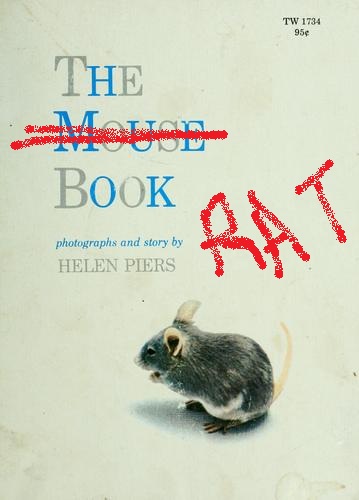
Six weeks into the Book Rat Project — a sustained experiment in which a book critic (me) attempts to act as a human algorithm for a willing subject (my Phoenix colleague Will Delman) — I finally found something the subject liked. Loved, even: Heidi Julavits's The Vanishers. I'm not at all surprised, because a) she's amazing b) this book was amazing. But don't listen to me: here's what the subject had to say about it:

I know Eugenia likes to keep these blog posts to 500
words or less, so I'll get right to it: Heidi Julavits' The Vanishers is a fantastic, deep and
complicated read. If I didn't already have another book on my plate for The Book
Rat, I'd be re-reading this one.
Julia Severn is a student at the Workshop, an elite New
England school for psychics. Her idol, the powerful and wild Madam Ackermann,
takes an unlikely interest in Julia despite her seemingly mediocre talents. When
Julia fails to satisfy her mentor, she first finds herself demoted from a
transcriber of astral travels to an archivist of miscellaneous notes and parking
tickets. Soon Julia is forced to withdraw from the Workshop for health reasons.
She tries to retreat to an anonymous life in New York City and put her psychic
past behind her, but soon Julia discovers that her former mentor is the source
of all her sufferings.
On its surface The
Vanishers sounds like an interesting book, even a fun book, but don't
be fooled: it's much more that that. This is a novel that explores the way loss,
disappointment, anger, deception and trauma can bleed down from generation to
generation, if only by degrees, to inform and destroy. It's also a complicated,
often troubling meditation on the complexities of relationships that have been
subjected to the stresses of depression, obsession, absence and replacement.
If anything, Julavits' psychic-thriller narrative often
feels like too thin a veil for an obvious investigation into the ways people can
emotionally and psychically strip-mine each other-often unconsciously-for their
personal needs and desires. And really this is the only thing that doesn't
completely work about The
Vansihers; the plot is good, solid and enjoyable, but it feels thin
compared to the heft of the artistic and psychological forces at play.
When Julia abandons the Workshop for a dead-end job in
New York, it's not the setting or the plot that drives things forward but the
author's descriptions of psychic torment and loneliness. By the time she leaves
New York for a recuperative asylum in Vienna, Julia and the characters around
her feel denser, the story more viscous, but The Vanishers still draws its gravity from
the fog.
Then again, this is kind of like criticizing Hitchcock's
Rope for its lack of scenery.
Could The Vanishers have been a
deeper meld of plot and theme? Maybe. But it's often the case that a blend too
smooth buries the most interesting flavors; sometimes novels like films, good
scotches, and certain characters are better when they're a bit rough around the
edges. So is The Vanishers
perfect? No. Is it worth you time, your money, and your interest?
This reader says yes, absolutely, and without
hesitation.
The Book Rat Letter Grade: A-
----------------
Score! I feel just like James Franco when he found out that he had reversed his father's Alzheimer's in Planet of the Apes. I hope to continue this trend with next week's selection: Birds of a Lesser Paradise, the debut story collection by Megan Mayhew Bergman. I chose this collection not because of its Renegade Craft Fair owl cover (see below) or its title's resemblance to the name of a certain Chicago indie rock band, but because of this glowing review on Book Riot.


















